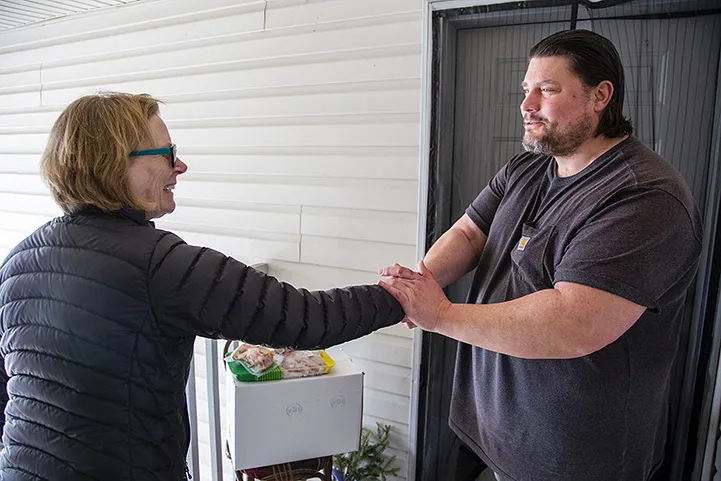Need continues as pandemic benefits end

John, right, thanks volunteer driver Claire while receiving a delivery of groceries at his apartment in Salem.
Late last year, demand for food assistance in our area escalated to a level higher than it had been even during the peak months of the pandemic.
The cost of essentials like housing, utilities and groceries skyrocketed last year, and in March 2023 more people than ever sought relief at Marion Polk Food Share’s network of partner pantries.
While for many people the pandemic is now in the rear-view mirror, our low-income neighbors are still reeling from its economic impacts as government relief programs come to an end.
Neighbors like John are finding it harder and harder to stretch their budgets amid record inflation. John spent 17 years working in law enforcement and criminal justice, but due to health conditions is now unable to work. He and his wife, a veteran, are both on disability and have three young daughters to support.
“The prices at the grocery store are so high that even though we make a decent income, it’s not decent anymore,” John says.
One key pandemic relief measure was an added set of benefits for Supplemental Nutrition Assistance Program (SNAP) recipients, which added about $90 per month in emergency funds to help low-income families weather the economic storm brought by the pandemic.
That program came to an end in February, leaving many of our neighbors living on the margins wondering how they’d continue to put enough food on their tables. For John and his family, who came to Salem after the 2020 Almeda Fire rendered their Medford-area home uninhabitable, losing the added benefits meant seeking help elsewhere.
“We got on food stamps because we had some rent increases and other things,” he says. “And then we were getting the extra funds on top of it, so I no longer needed to hit the pantries because I was getting enough assistance through SNAP.”
Knowing that the emergency benefits were coming to an end, John turned to the Food Share’s website for help and found out about the Home Grocery Delivery program. He has limited mobility, so receiving food delivered right to his door saves a lot of undue physical strain in addition to saving on vehicle expenses.
Every month, volunteer drivers with the Home Grocery Delivery program make about 200 deliveries to households in Salem and Keizer, reaching over 350 individuals. The program is a vital source of food relief for neighbors who, due to health, transportation or other issues, are unable to receive assistance at their local pantries.
John called to sign up and soon began receiving twice-monthly deliveries of healthy foods, including fresh produce and dairy products. He’s awed by the friendliness of the volunteers who carry the items up to his second-floor apartment, and he’s grateful to have some help through difficult times when his limited food budget just isn’t going as far.
“Everybody’s being affected by this, somehow, some way,” he says. “Because the money you had in your pocket a year or two ago is just not the same.”


